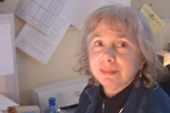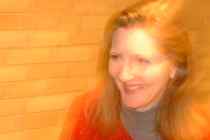Forum
Our Favorite Love Poems
| Julie
Campbell Carol Stevens Francine McGregor Angela Vietto |
Martin
Scott Olga Abella John Guzlowski |
This sonnet is one of a series that partakes of the Italian poetic form, the corona or crown, in which the last line of a poem serves as the first line of the next poem. Wroth’s series contains 14 sonnets dedicated to illustrating the beauties, joys, jealousies, and heartbreaks of love. Wroth’s lover, her cousin William Herbert, Earl of Pembroke, led her through the vicissitudes of love with a vengeance, and her depictions of their relationship are intricately layered in her poetry and and prose romance. In Underwood, #28, Ben Jonson famously wrote that “exscribing” Wroth’s poetry made him “A better lover, and much better poet.”
Sonnet #7 from
A Crowne of Sonetts dedicated to Love
by Lady Mary Wroth
How blest bee they then, who his favors prove
A lyfe wherof the birth is just desire,
Breeding sweet flame which hearts invite to move
In thes lov’d eyes which kindle Cupids fire,And nurse his longings with his thoughts intire,
Fixt on the heat of wishes formd by love,
Yett wheras fire destroys this doth aspire,
Increase, and foster all delights above;Love will a painter make you, such, as you
Shall able bee to drawe your only deere
More lively, parfett, lasting, and more true
Then rarest woorkman, and to you more neere,Thes be the least, then all must needs confess
Hee that shunns love doth love him self the less.

 |
My favorite love poem? It would have to be Donne's "A Valediction: Forbidding Mourning." It has all of the things I like best about Donne: that combination of tremendous erudition, wordplay, and compression of a worldview into a few lines, and a sense of the world of lovers as intensely private at the same time he's overcome with his own displays of cleverness and obviously relishes the notion of an audience out there. Reminds me a lot of my spouse, in more ways than one. There were all of those years of commuting, the weekends stolen from work and enforced separations at their conclusion, during which this poem took on an intensely personal meaning for me which it has never lost.
A Valediction: Forbidding Mourning
by John DonneAs virtuous men pass mildly away,
And whisper to their souls to go,
Whilst some of their sad friends do say
The breath goes now, and some say, No;So let us melt, and make no noise,
No tear-floods, nor sigh-tempests move,
‘Twere profanation of our joys
To tell the laity our love.Moving of th’ earth brings harms and fears,
Men reckon what it did and meant;
But trepidation of the spheres,
Though greater far, is innocent.Dull sublunary lovers’ love
(Whose soul is sense) cannot admit
Absence, because it doth remove
Those things which elemented it.But we by’a love so much refined
That our selves know not what it is,
Inter-assuréd of the mind,
Care less, eyes, lips, and hands to miss.Our two souls therefore, which are one,
Though I must go, endure not yet
A breach, but an expansion,
Like gold to airy thinness beat.If they be two, they are two so
As stiff twin compasses are two;
Thy soul, the fixed foot, makes no show
To move, but doth, if th’ other do.And though it in the center sit,
Yet when the other far doth roam,
It leans and hearkens after it,
And grows erect, as that comes home.Such wilt thou be to me, who must
Like th’ other foot, obliquely run;
Thy firmness makes my circle just,
And makes me end where I begun.

 |
Francine McGregor
A little love song to spring just to remind us that we won’t be trapped in this grey, icy haze forever.
|
The
Cuckoo Song Sumer is icumen in, Lhouth after calve cu lows cow Bulloc sterteth, bucke ferteth. Murie sing, cuccu! Cuccu, cuccu, Wel singes thu, cuccu. Ne swik thu naver nu! |
The ewe bleats after her lamb |
 |
I'm always impressed by the way this poem takes the most
terrifying aspect of romantic love--the possibility of losing control,
of surrendering one's will to that of the beloved--and sells us on the
idea that it's beautiful and natural. As always, cummings finds his own
language for what is too difficult to say.
somewhere i have never travelled
by e. e. cummings
somewhere i have never travelled, gladly beyond
any experience, your eyes have their silence:
in your most frail gesture are things which enclose me,
or which i cannot touch because they are too nearyour slightest look easily will unclose me
though i have closed myself as fingers,
you open always petal by petal myself as Spring opens
(touching skillfully, mysteriously) her first roseor if your wish be to close me, i and
my life will shut very beautifully, suddenly,
as when the heart of this flower imagines
the snow carefully everywhere descending;nothing which we are to perceive in this world equals
the power of your intense fragility: whose texture
compels me with the colour of its countries,
rendering death and forever with each breathing(i do not know what it is about you that closes
and opens; only something in me understands
the voice of your eyes is deeper than all roses)
nobody, not even the rain, has such small hands
 |
Martin Scott
The Telephone Number of the Muse
by Donald Justice
Sleepily, the muse to me: “Let us be friends.
Good friends, but only friends. You understand.”
And yawned. And kissed, for the last time, my ear.
Who earlier, weeping at my touch, had whispered:
“I loved you once.” And: “No, I don’t love him,
Not after everything he did.” Later,
Rebuttoning her nightgown with my help:
“Sorry, I just have no desire, it seems.”
Sighing: “For you, I mean.” Long silence. Then:
“You always were so serious.” At which
I smiled, darkly. And that was how I came
To sleep beside, not with her; without dreams.
I call her up sometimes, long distance now.
And she still knows my voice, but I can hear,
Beyond the music of her phonograph,
The laughter of the young men with their keys.
I have the number written down somewhere.
________
| from
New and Selected Poems, Alfred A. Knopf, 1995
Click
to order.
 |
Olga Abella
I think what pulls me into this poem is the voice, its direct, matter of fact tone about the uses and abuses we humans commit with the word love. We use this word so casually in our lives that when it comes to the private exchange of emotions between two people who share intimacy, it becomes questionable how a word so dilluted by its trivial associations can express such closeness. At the same time, however, in the second stanza, Atwood suggests a justification/explanation of our diminution of this word. Simply put, love (and all its ramifications) scares us. This poem makes me think—and feel.
Variations on the Word Love
by Margaret AtwoodThis is a word we use to plug
holes with.It's the right size for those warm
blanks in speech, for those red heart-
shaped vacancies on the page that look nothing
like real hearts. Add lace
and you can sell
it. We insert it also in the one empty
space on the printed form
that comes with no instructions. There are whole
magazines with noth much in them
but the word love, you can
rub it all over your body and you
can cook with it too. How do we know
it isn't what goes on at the cool
debaucheries of slugs under damp
pieces of cardboard? As for the weed-
seedlings noshing their tought snouts up
among the lettuces, they shout it,
Love! Love! sing the soldiers, raising
their glittering knives in salute.Then there's the two
of us. This word
is far too short for us, it has only
four letters, too sparse
to fill thsoe deep bare
vacuums between the stars
that press on us with their deafness.
It's not love we don't wish
to fall into, but that fear.
This word is not enough but it will
have to do. It's a single
vowel in this metallic
silence, a mouth that says
O again and again in wonder
and pain, a breath, a finger
grip on a cliffside. You can
hold on or let go.
![]()
 |
John Guzlowski
I first heard Philip Appleman's "This Year's Valentine" on Garrison Keillor's "Writer's Almanac" program. It was some time soon after Sept. 11. I was writing a group of poems that tried to think about the world I suddenly had before me, a world where nothing was certain, and everything was frightening.
What immediately hit me in Appleman's poem was his clear sense of such a world. He captured it and he captured too the desperate need for some kind of human miracle that might save him and might save us. That spoke to me.
If you want to hear the poem, it is available online.They could
pump frenzy into air ducts
and rage into reservoirs,
dynamite dams
and drown the cities,
cry fire in theaters
as the victims are burning,
but
I will find my way through blackened streets
and kneel down at your side.
They could
jump the median, head-on,
and obliterate the future,
fit .45's to the hands of kids,
and skate them off to school,
flip live butts into tinderbox forests
and hellfire half the heavens,
but
in the rubble of smoking cottages
I will hold you in my arms.They could
send kidnappers to kindergartens
and pedophiles to playgrounds,
wrap themselves in Old Glory
and gut the Bill of Rights,
pound at the door with holy screed
and put an end to reason,
but
I will cut through their curtains of cunning
and find you somewhere in moonlightWhatever they do with their anthrax or chainsaws,
however they strip-search or brainwash or blackmail,
they cannot prevent me from sending you robins,
all of them singing: I'll be there.
![]()
